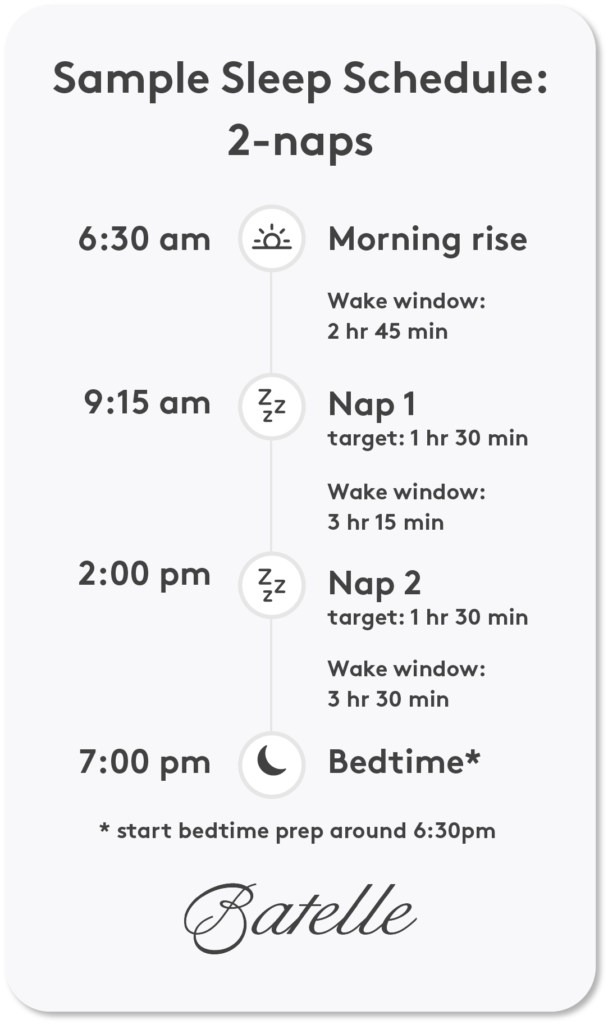
According to the National Sleep Foundation, 8-month-old babies should get 12-16 hours of sleep in a 24-hour period, including both naps and nights. Ideally, they should have 10-12 hours of sleep during the night, and 2-3 hours of sleep during the day, divided between 2 naps.

Keep in mind that the length of each nap can differ, just be sure to cap any single nap at no longer than 2 hours. Doing so will help you manage your little one’s sleep pressure to help ensure they get optimal daytime sleep and help you keep their sleep schedule on track.
The goal is that your baby naps for a cumulative daytime total of 2-3 hours, but this is just an average. Every child is unique, so if your little one seems content and well-rested with slightly more or less daytime sleep, that’s perfectly okay. It’s not necessary to focus too much on the exact numbers.
The goal for an 8-month-old baby is to achieve approximately 10-12 hours of nighttime sleep. Most babies start to sleep through the night around 6-9 months, but this can vary. Sleep patterns vary considerably among babies, so at 8 months, many infants are still in the process of consolidating sleep periods and sleeping for longer stretches at night. Night waking is still common, and night feeding can also still be common at this age – especially for breastfed infants.
It’s also important to note that the definition of ‘sleeping through the night’ can differ from family to family. Some may consider their baby to be sleeping through the night even if there are a few night wakings, as long as these wakings are efficiently handled and do not significantly impact overall sleep. Others might define it as a completely uninterrupted stretch from bedtime until morning.
By 10-12 months old, many babies are capable of sleeping for longer periods of 10-12 hours at night without waking. However, these are general guidelines and can vary widely among individual babies.
Typically, the longest stretch of uninterrupted sleep is at the beginning of the night, with more restless sleep occurring during the second half of the night and early morning. This is because sleep pressure and melatonin are highest at the start of the night and dissipate toward morning hours.
If your little one is not sleeping for a solid period in the first part of the night, you may want to take a look at their sleep schedule to see if they may be going to bed overtired, or perhaps not tired enough. It’s also useful to look at their feeding schedule to ensure they’re getting most of their feeds in during daytime hours as this helps to encourage longer stretches of sleep at night. Just remember, it’s always a good idea to consult with your pediatrician before making big changes to your little one’s feeding routine – especially if they were born prematurely or are underweight.
In addition to the schedule transitions that are common at this age, there are also developmental milestones occurring that can contribute to the 8-month sleep regression. 8-months is a common time for separation anxiety to peak thanks to your little one’s budding realization that objects and people continue to exist even when they’re out of sight. Additionally, teething and increased mobility can impact sleep.
Sleep regressions can last for 2-6 weeks. The severity and duration of sleep disruption due to schedule transitions and developmental milestones depends on several factors including your response to your little one during these times. It’s normal to need to offer support to help your baby sleep during the most acute phases of developmental growth, when they’re experiencing discomfort from teething, or when they’ve had a tough nap day and too little sleep. However, it can be easy to get stuck in an unsustainable pattern if your main method of settling your child back to sleep involves a lot of interaction from you.
Typically, families who have well-established and consistent bedtime routines, nighttime interactions, and sleep habits tend to experience shorter and less intense periods of sleep disruption. This is where sleep training can be beneficial as you learn to implement consistent routines throughout the night and healthy sleep habits that can help foster your little one’s ability to self-soothe so they can more effectively transition between sleep cycles throughout the night without relying solely on a feed or rocking for example.
